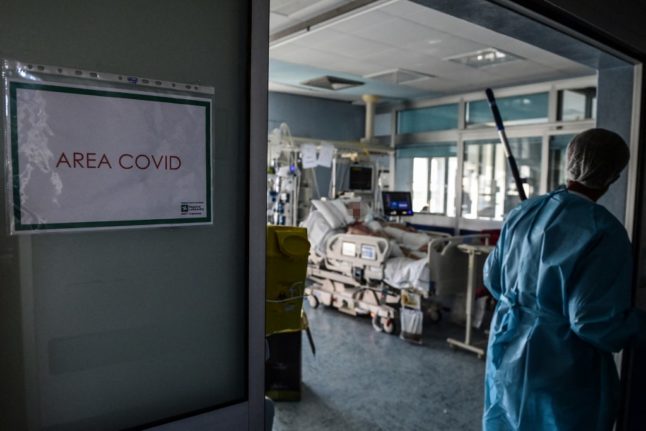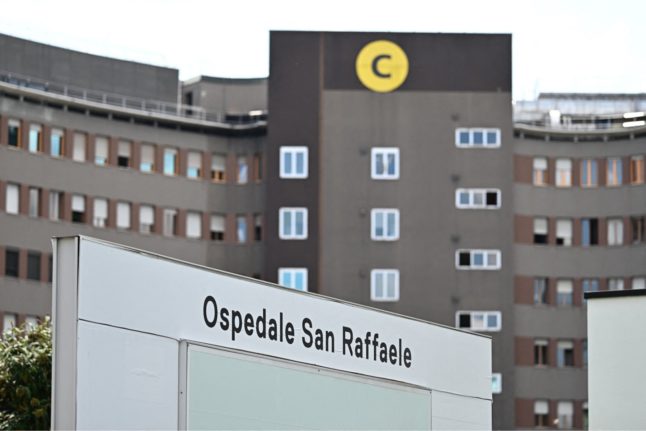Few Covid-related restrictions remain in Italy today, six months after the nationwide ‘state of emergency’ ended.
The previous government had kept only a handful of precautionary measures in place – which the new government, led by Giorgia Meloni, must now decide whether or not to keep.
The cabinet is holding a meeting on Monday and will issue a decree this week detailing any changes to the health measures.
Many expect the government to scrap all measures entirely by the end of the year, after Meloni and her party criticised the way Mario Draghi’s administration handled the pandemic throughout its tenure.
Meloni clearly stated in her first address to parliament last Tuesday that “we will not replicate the model of the previous government” when it comes to managing Covid.
READ ALSO: Five key points from Meloni’s first speech as new Italian PM
While she acknowledged that Italy could be hit by another Covid wave, or another pandemic, she did not say how her government would deal with it.
Meanwhile, new health minister Orazio Schillaci issued a statement on Friday confirming the end of several existing measures, saying he “considers it appropriate to initiate a progressive return to normality in activities and behaviour”.
Workplace ban for unvaccinated medical staff
Schillaci confirmed that the ministry will allow doctors, nurses and other healthcare professionals to return to work after being suspended because they refuse to get vaccinated against Covid-19.
Those who refuse vaccination will be “reintegrated” into the workforce before the rule expires at the end of this year, as part of what the minister called a “gradual return to normality”.
They will be allowed to return “in light of the worrying shortage of medical and health personnel” and “considering the trend of Covid infections”, the statement said.
Fines issued to healthcare staff aged over 50 who refused vaccination would also be cancelled, it added.
There were some 1,579 doctors and dentists refusing vaccination at the end of October, representing 0.3 percent of all those registered with Italy’s National Federation of the Orders of Physicians, Surgeons and Dentists (Fnomceo)
Daily Covid data reports
Schillaci also confirmed in the statement that the health ministry will no longer release daily updates on Covid-19 contagion rates, hospital cases and deaths, saying this would be replaced by a weekly update.
It said it would however make the data available at any time to relevant authorities.
Mask requirement in hospitals to stay?
The requirement to wear face masks in hospitals, care homes and other healthcare facilities expires on Monday, October 31st.
At a meeting on the same day the government is expected to decide whether to extend the measure.
READ ALSO: What can we expect from Italy’s new government?
While the government had looked at scrapping the requirement, it reportedly changed stance at the last minute on Monday after facing heavy criticism from health experts.
Media reports published while the meeting was in progress on Monday said government sources had indicated the measure would in fact be extended.
Confirmation is expected to come later on Monday.

‘Green pass’ health certificate
There is no indication that the new government plans to bring back any requirements to show a ‘green pass’: the digital certificate proving vaccination against or recent recovery from Covid, or a negative test result.
The pass is currently only required for entry to healthcare facilities and care homes, and this is expected to remain the case.
‘Dismantling the measures’
Some of the confirmed changes were strongly criticised by Italy’s most prominent healthcare experts.
Head of the Gimbe association for evidence-based medicine, Nino Cartabellotta, said the focus on cancelling fines for unvaccinated healthcare workers was “irrelevant from a health point of view .. but unscientific and highly diseducative”.
He told news agency Ansa it was “absolutely legitimate” for a new government to discontinue the previous administration’s measures, but that this “must also be used to improve everything that the previous government was unable to do”.
The government should prioritise “more analytical collection of data on hospitalised patients, investments in ventilation systems for enclosed rooms … accelerating coverage with vaccine boosters,” he said.
However, the plan at the moment appeared to be “a mere dismantling of the measures in place,” he said, “in the illusory attempt to consign the pandemic to oblivion, ignoring the recommendations of the international public health authorities”.



 Please whitelist us to continue reading.
Please whitelist us to continue reading.
Member comments